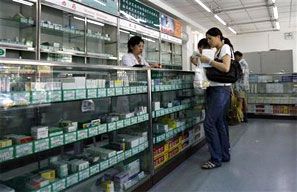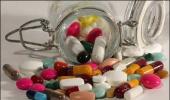The latest price revision includes mostly cardiovascular drugs, anti-bacterials, anti-herpes, contraceptives and gastrointestinal medicines
Barely a month after reducing the maximum retail price (MRP) of 151 packs, National Pharmaceutical Pricing Authority is set to slash prices of another 25 essential medicine packs by up to 90.26 per cent. The latest price revision includes mostly cardiovascular drugs, anti-bacterials, anti-herpes, contraceptives and gastrointestinal medicines, said an official. For instance, the MRP of Clopidogrel 75 mg, a cardio vascular medicine used to inhibit blood clots in coronary artery disease and peripheral vascular disease, will drop from Rs 88.77 a tablet to a mere Rs 1.36 per tablet. Similarly, the price of Isosorbide 5 Dinitrate 10 mg, another cardio vascular drug, will reduce by 19 per cent. The price of anti-herpes injection Acyclovir 250 mg will drop by 41 per cent to Rs 460.05 from Rs 672 earlier.
For instance, the MRP of Clopidogrel 75 mg, a cardio vascular medicine used to inhibit blood clots in coronary artery disease and peripheral vascular disease, will drop from Rs 88.77 a tablet to a mere Rs 1.36 per tablet. Similarly, the price of Isosorbide 5 Dinitrate 10 mg, another cardio vascular drug, will reduce by 19 per cent. The price of anti-herpes injection Acyclovir 250 mg will drop by 41 per cent to Rs 460.05 from Rs 672 earlier.
The decision was taken during an NPPA meeting on Friday. The drug price regulator is likely to notify the price orders by Monday. After notification, drug makers will have 45 days to replace the existing stocks from the market with packs carrying the revised MRP.
The price reduction starts from 15.21 per cent.
“We have taken IMS Health data for calculations as per Drugs Price Control Order (DPCO), 2013,” an official with direct knowledge of the development told Business Standard.
The DPCO, 2013 was recently notified by the government in line with the new pharmaceutical pricing policy cleared by the government last year. The DPCO, 2013 mandates NPPA to cap prices of 348 essential medicines based on the arithmetic average of all drugs in a particular segment with more than one per cent market share.
Significantly, those who have their products currently priced below the cap will not be allowed to raise their prices to match the cap. This means the new formula will not allow prices to go up from the current level. Also, the new prices will be notified only for additional drugs that now enter the schedule category. Those already under price control can be sold at the existing MRP for one year.
The new market-based mechanism is in contrast with the earlier DPCO, 1995 which was based on cost-plus-profit formula.
According to industry analysts, drug makers such as GlaxoSmithKline Pharma, Cipla, Ranbaxy, Dr. Reddy Laboratories and Abbott selling essential medicines are seen to be impacted the most because of the new pricing regime.
The first price notification in line with the new policy had come on June 17, capping prices of 151 medicines. With the latest decision, the government has fixed new prices of a total of 176 medicine packs out of a total 652 packs of 348 essential medicines. The packs are according to different strengths and dosages of a particular medicine.
The regulator’s next meeting is now scheduled for July 15, when it may take a call on the next batch of drugs.
“We are doing it in phases to make the transition systematic and simpler,” said the official.












 © 2025
© 2025